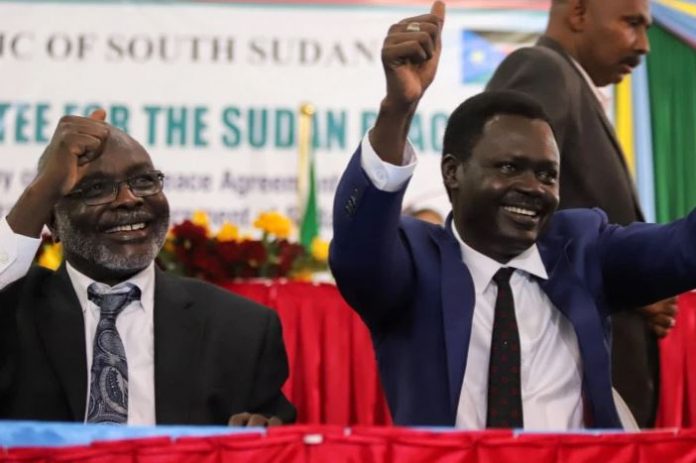Sudan’s government and rebel leaders gathered on Saturday to drumming, singing and dancing as they signed a landmark peace deal aimed at ending decades of war in which hundreds of thousands died.
“Today we have reached a peace agreement. We are happy. We have finished the mission,” Tut Gatluak, head of the South Sudanese mediating team said, shortly before the signing of the deal that happened a year after the peace talks began.
Minister and leaders of governments from neighbouring countries as well as Egypt, Qatar and Saudi Arabia attended the ceremony in Juba, the capital of neighbouring South Sudan.
“This signing of this agreement today is a significant day today for Sudan and South Sudan … it means an end to suffering of many Sudanese people in different corners of Sudan and outside Sudan,” said Mini Arko Minawi, leader of the Sudan Liberation Movement which is one of the parties to the deal.
“Obviously, economic challenge in Sudan is one of the challenges. Also fragile political situation is one challenge but I am sure we will achieve the peace we want … there is need for tolerance,” he added.
Entertainers from South Sudan and Sudan performed for the guests, while members of the rebel groups from Darfur, South Kordofan and the Blue Nile marched, singing songs of joy and carrying banners bearing the images of their party leaders.
Ending Sudan’s internal conflicts has been a top priority of the transitional government in power since last year’s overthrow of longtime leader Omar al-Bashir amid a popular pro-democracy uprising.
The peace talks were mediated by South Sudan whose leaders themselves battled Khartoum as rebels for decades before achieving independence in 2011.
Al Jazeera’s Hiba Morgan, reporting from the Sudanese capital, Khartoum, said not every group was present in Juba.
“While this deal is been called the final agreement, there are major groups that are yet to sign an agreement with the transitional government,” Morgan said.
“The biggest concern is the implementation of the security arrangement because there are concerns about splinter groups,” Morgan added.
‘Challenges and pitfalls’
Sudan’s leaders, including Prime Minister Abdalla Hamdok, head of the transitional sovereign council General Abdel Fattah al-Burhan and Lieutenant general Mohamed Hamdan Dagalo, deputy chief of Sudan’s joint military-civilian sovereign council, attended the ceremony.
In a statement upon his arrival, Hamdok said that “peace will open broad horizons for development, progress and prosperity”.
However, he conceded that the future will not be easy.
“The peace-building process faces various challenges and pitfalls that we can overcome through concerted efforts and joint action.”
Sudan has been torn by multiple conflicts between the Arab-dominated government that was led by al-Bashir for three decades and rebels drawn from non-Arab ethnic groups in its far-flung regions.
In Sudan’s vast rural areas, settled ethnic minority farmers have frequently competed for scarce resources with Arab herders, who have often been backed by Khartoum.
Tensions have been heightened by economic hardship, especially after the 2011 secession of South Sudan which deprived the north of three-quarters of its oil reserves.
Multiple civil wars have raged since independence in 1956, including the 1983-2005 war that led to the secession of the south.
The devastating war in Darfur from 2003 left at least 300,000 people dead and 2.5 million displaced in its early years, according to the United Nations.
Source – AL JAZEERA and News Agencies
















